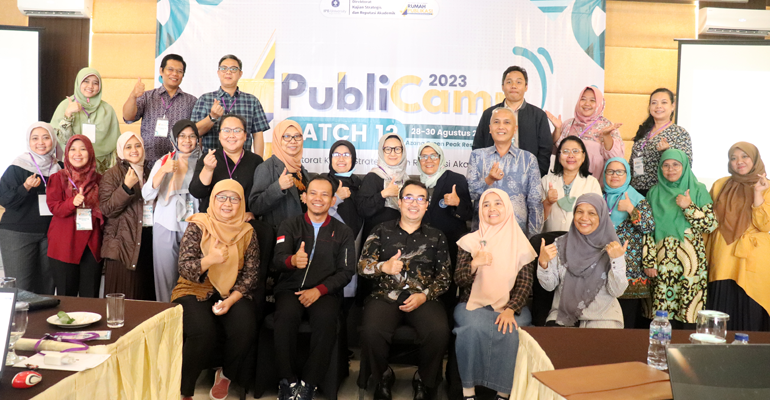DKSRA IPB University Targets Writing Scientific Articles to Reach 2000 Manuscripts

The Directorate of Strategic Studies and Academic Reputation (DKSRA) IPB University this year targets 2000 scientific articles to be published. To support this target, DKSRA IPB University carried out PubliCamp activities. PubliCamp was held with the aim of improving the quality and accelerating the increase in the number of scientific articles written by IPB University lecturers and students. The activities are divided into two batches, namely batch 1 on August 16 2023 for Undergraduate and Postgraduate students. While batch 2 will be held on 28-29 August 2023 for lecturers.
Prof. Ernan Rustiadi, Deputy Rector of IPB University for Agromaritime Research, Innovation and Development, said that publications are a bridge to connect the knowledge we have to society. Thus, he said, knowledge from campus can be channeled to the wider community.
This activity was held in order to increase the quantity and quality of IPB University’s publications in journals of global reputation as part of world university rankings, as well as reducing the gap and disparity in publications among the IPB University academic community.
Meanwhile, Prof Anuraga Jayanegara, Director of Strategic Studies and Academic Reputation at IPB University, said that IPB University is still continuing to strive to improve its reputation in terms of scientific publications. Therefore, the participants were given a comfortable time and place to complete their manuscripts. Not only that, participants received coaching facilities for direct sharpening from experienced speakers.
“IPB University’s publications in Q1 class journals are currently at 18 percent, this figure has actually increased from a few moments ago which was only 9 percent. But if we compare it with the Bandung Institute of Technology, their publication in the Q1 journal is at 33 percent,” said Prof Anuraga.
One of the participants and lecturers, Dr Willy Bayuardi Suwarno, said that this event was very interesting and useful for lecturers and students. “This PubliCamp event would be very good and very useful for both students and lecturers. “For students, of course they can speed up the process of writing their publications through coaching,” said Dr Willy Bayuardi, IPB University lecturer from the Department of Agronomy and Horticulture.
The same thing was conveyed by Dr Eva Anggraini, Director of Global Connectivity of IPB University. “We get very valuable feedback from reviewers and this is a very good ecosystem because participants and reviewers can improve each other, give each other input, and encourage each other. In addition, there is a transfer of knowledge that occurs in this event. I hope that this PubliCamp event can continue to be held and continue in the future,” said Dr Eva Anggraini.
One of the IPB University students, Nikolaus Advent Christiawan, said that he really felt helped, especially by the lecturers and reviewers who were professional and expert in journal writing and publication. He also said that the event went very well and gave the participants a sense of comfort in being able to prepare and complete their publications. (AEA/ra) (IAAS/AMR).



